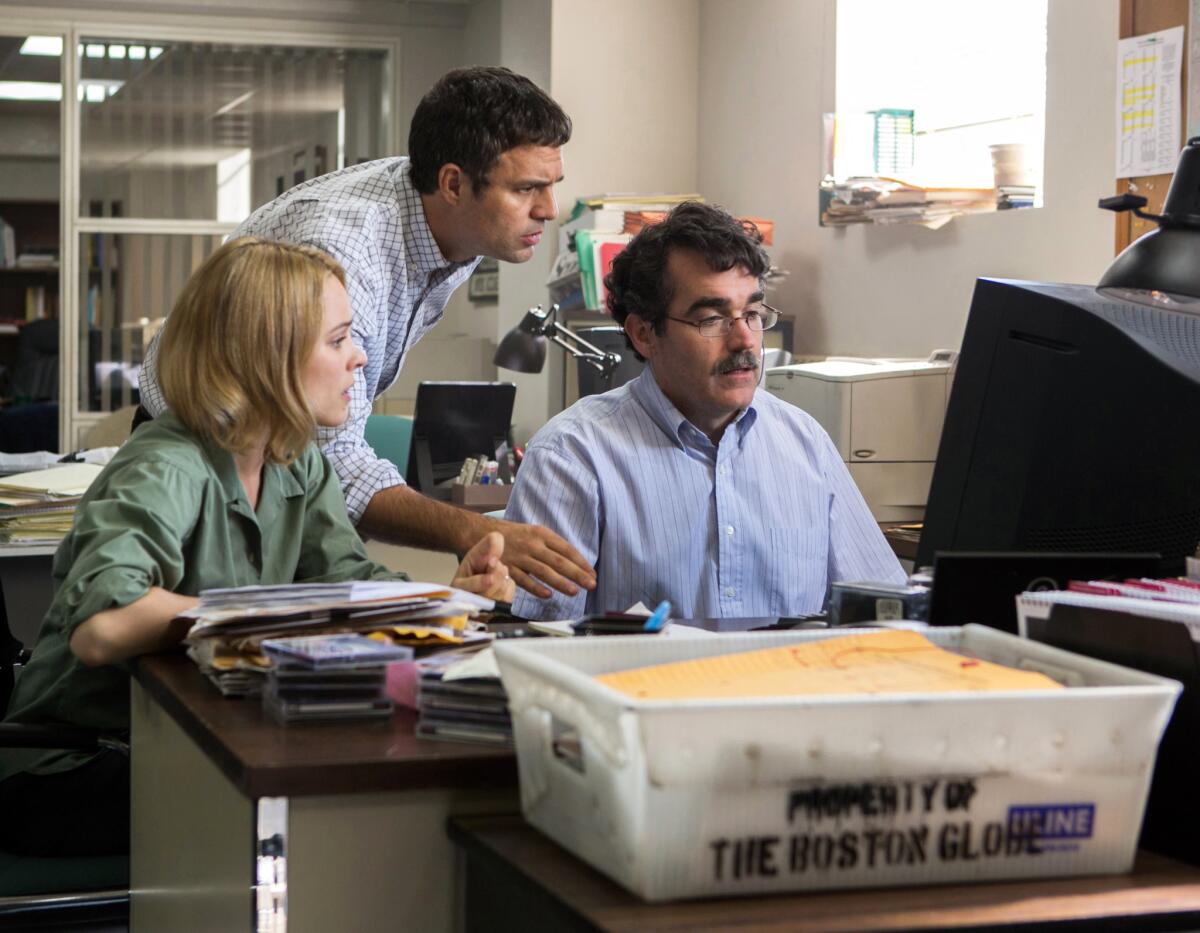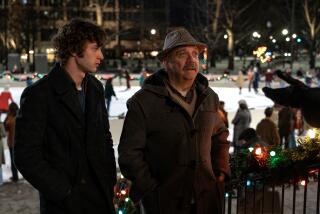Perspective: ‘Spotlight’ makes journalism great again with a savvy Oscars campaign

Rachel McAdams, from left, as Sacha Pfeiffer, Mark Ruffalo as Michael Rezendes and Brian d’Arcy James as Matt Carroll, in a scene from “Spotlight.”
Like moms and your friend with the garage band, there’s no surer way to speak to the souls of journalists than to tell them no one appreciates them like you do. Who doesn’t want to be told they’re better than people give them credit for?
Such was the strategy this season in the race for Oscar best picture, of all places, where “Spotlight” has made a strong case ahead of Sunday’s show.
OSCARS 2016: Full coverage | List of nominees | #OscarsSoWhite controversy
Tom McCarthy’s deftly executed film — a story about reporters — used reporters to tell its story to, well, reporters. The message they delivered was simple: Journalism has become an undervalued profession, and this movie was here to correct that.
Since it rolled out nearly six months ago, the campaign for the Open Road release has needed to follow a unique path. The low-key procedural abut how Boston Globe reporters slowly unearthed the story of Catholic Church sex abuse and the conspiracy to cover it up was initially in a tough spot. The film was about a subject uncomfortable at worst and process-based at best, and about a profession that can be, well, let’s just say not super-cinematic to watch on the big screen.
So the campaign made the groundbreaking journalism the thing. Any fact-based movie is keen to trot out the real-life personalities, especially if they’re heroic. But “Spotlight” — one of three front-runners to win best picture prize on Sunday, along with “The Revenant” and “The Big Short” — had the added benefit of having many of its personalities available and appealing. (It also made the survivors the thing, as my colleague Amy Kaufman wrote about earlier this week, but that’s another story.)
And so from a very early stage — a now-famous screening at the Toronto International Film Festival where many reporters came to the podium — the journalists have been front and center.
The paper’s then-editor Martin Baron (a former Times editor, played by Liev Schreiber in the movie) has appeared at Hollywood and media events. So have other Globe figures, including Walter Robinson (Michael Keaton), who headed up the investigation, and reporters such as Michael Rezendes and Sacha Pfeiffer (Mark Ruffalo and Rachel McAdams). I tailed the latter three at an appearance with Charlie Rose in New York and the sight of the journalists — eager to talk about their findings, ambivalent about flouting the rule against becoming the story — was fascinating to watch.
Nor was journalist support limited to the movie’s subjects. Luminaries such as CNN’s Anderson Cooper and the New York Times’ Nicholas Kristof offered endorsements on social media. (“a great movie about great journalism,” Kristof said, then wished “1,000 Oscars” to the film in a message to producer Nicole Rocklin). A glowing op-ed was penned by former San Francisco Chronicle editor and current Center for Investigative Reporting chief Phil Bronstein.
After many weeks of effort, Open Road and production company Anonymous Media also earlier this month secured an endorsement from Watergate journalist and “All the President’s Men” character Carl Bernstein. He said, in part, “Spotlight is a film that demonstrates finally, in the era of Twitter, why we need great reporting: more than ever — and shows how real journalism is done, with all its difficulty and complexity and, especially, the moral ambiguities and choices a truly free press must deal with.”
The socially conscious Hollywood company Participant Media, which financed the movie and has led the campaign to raise awareness for it, says much of this support has been organic. Maybe so, though like any savvy activist group, it has been eager to emphasize such naturalist endorsements.
Did all of this ensure that a general audience and awards voters all knew how important the film was? Absolutely.
Did it even help propel the film to a strong place at the box office (nearly $40 million and still going). Almost certainly.
But what it also did was give the movie the seal of approval to other journalists, who of course are the ones making the decisions about whether to cover it in the first place. Journalists this year faced the temptation of spreading the love to a different gravitas-drenched Oscar front-runner, the Wall Street-themed “The Big Short.” That movie has been jockeying for position with “Spotlight” for the unofficial crown of Best Picture Nominee Whose Importance Goes Well Beyond the Multiplex. “Spotlight’s” endorsements — its status as the journalist’s movie — made the decision a little easier.
I asked McCarthy at one point if this was the easiest press tour he’s ever been on. Were journalists spending half their interview time thanking him and telling him what a great job he’d done? He laughed and said “Yes. But they deserve it.”
McCarthy sincerely believes in the value of original reporting — in part perhaps because his own method of filmmaking uses the same level of detail-oriented relentlessness that makes for good journalism. (I’ve been on a McCarthy set and have had the pleasure of watching some great reporters in action. The two activities not as different as you’d think. )
But McCarthy’s beliefs also came with the side benefit of helping his movie’s cause. What person, after years of hearing that they’re not worthy, that they’re in a dying profession, that their actions matter little, wouldn’t want a little affirmation? Well-adjusted people like your accountant brother-in-law, would find it hard to resist. Intense, often single-minded types, as we journalists tend to be, would be in from the word go.
To paraphrase someone who doesn’t like the media very much, Journalists needed a win. They don’t win anymore. And this season, McCarthy was here to ensure they got one.
The most central question in all this for Participant and Open Road, though — the big question, really, as we head into Sunday’s Oscars — is whether any of this will work with the people who really matter: voters.
Many presidential candidates this time of year, especially GOP candidates, tend to run against the media. The campaign for “Spotlight” in more liberal Hollywood has been to run with the media.
Now it wouldn’t seem like the average Oscar voter would be amenable to this flattery, especially not in a year when — let’s face it — the media has been pretty hard on them for their efforts on diversity. Flattering journalists helps you gain coverage; it doesn’t necessarily help you gain Oscar bids.
With one big, meaty exception: Bernstein.
Or, more specifically, with what Bernstein represents.
The journalist immediately conjures up thoughts of “All the President’s Men” — a movie that didn’t win best picture but in many minds deserved to. Maybe more important, it reminds many Oscar voters of a particular era. The median age of Academy of Motion Picture Arts and Sciences members, per a Times study in 2012, is 62 — an age that means these same voters would have been in their idealistic and impressionable early 20s when “All the President’s Men” came out.
It’s why, for all of the maneuvering and split-voting of the past few months — including an insurgent candidacy for “The Revenant” — I’m still taking “Spotlight” in the office Oscar pool.
It’s also why I think a lot of voters will respond to the movie. Citing journalists is a way to appeal to other journalists. But citing good journalism is a way to appeal to a far more powerful force: nostalgia.
How to throw the ultimate viewing party (and no, it’s not too late)
Is ‘Brooklyn’ the new ‘Casablanca’? Best picture nominees recall past winners
#OscarsSoWhite stirs the days before the ceremony; how will it affect the big night?
More to Read
Only good movies
Get the Indie Focus newsletter, Mark Olsen's weekly guide to the world of cinema.
You may occasionally receive promotional content from the Los Angeles Times.







